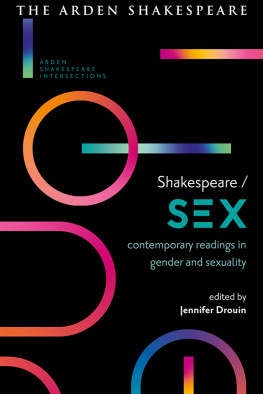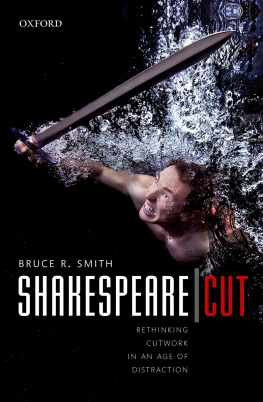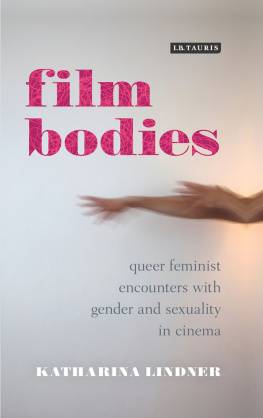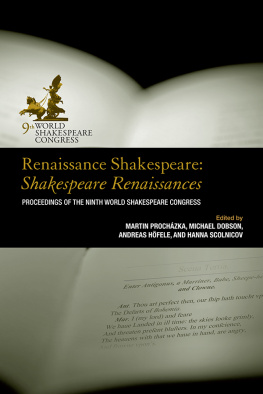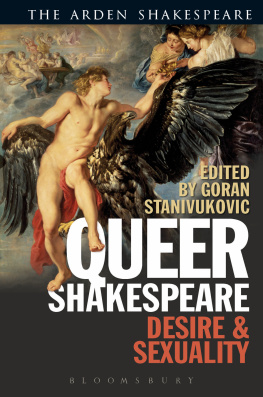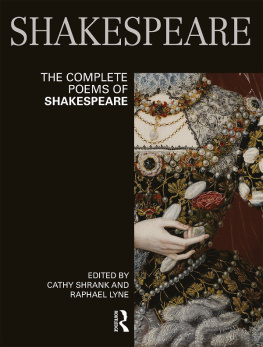Shakespeare / Sex
Arden Shakespeare Intersections
Published in association with the London Shakespeare Centre at Kings College London, this series sets the future agenda for Shakespeare research and criticism. Each edited volume examines a Shakespearean intersection that has been chosen to encourage inventive reflections, suggestions for future directions for the field, and engagements of a broad, interdisciplinary nature.
Series Editors: Farah Karim-Cooper, Gordon McMullan, Lucy Munro and Sonia Massai
Shakespeare / Sense: Contemporary Readings in Sensory Culture
Edited by Simon Smith
ISBN 978-1-4742-7323-7
Forthcoming
Shakespeare / Text: Contemporary Readings in Textual Studies, Editing and Performance
Edited by Claire M. L. Bourne
ISBN 978-1-3501-2814-9
Shakespeare / Sex
Contemporary Readings in Gender and Sexuality
Edited by Jennifer Drouin

Urvashi Chakravarty is Assistant Professor of English at the University of Toronto. She has published articles in English Literary Renaissance, Shakespeare Quarterly, the Journal of Early Modern Cultural Studies and the collection Queering Childhood in Early Modern English Drama and Culture (2018). She is currently completing a monograph titled Fictions of Consent: Slavery, Servitude, and Free Service in Early Modern England.
Kate Chedgzoy is Professor of Renaissance Literature and Director of Equality, Diversity and Inclusion for Humanities and Social Sciences at Newcastle University. She is a queer, feminist scholar of Shakespeare, womens writing and childhood, and is currently working on a project on early modern children, and one in collaboration with Newcastle-based feminist theatre company Open Clasp.
Jennifer Drouin is the author of Shakespeare in Qubec: Nation, Gender, and Adaptation (2014) as well as numerous essays on early modern gender and sexuality and contemporary adaptations of Shakespeare. Formerly a tenured Associate Professor of English in the United States, she is currently teaching in the Faculty of Law at McGill University where she recently completed BCL and LLB degrees in civil and common law.
Colby Gordon is an Assistant Professor in the English department of Bryn Mawr College. He is currently completing a manuscript entitled Glorious Bodies: Trans Theology and Renaissance Literature.
Huw Griffiths is a Senior Lecturer in early modern English literature at the University of Sydney. His research interests are in early modern drama, politics and histories of sexuality. His upcoming monograph is called Shakespeares Body Parts: Figuring Sovereignty in the History Plays, and his current project traces the seventeenth- and eighteenth-century adaptation of early modern drama as a lens through which to construct a history of male same-sex friendship and desire.
Allison P. Hobgood is Associate Professor of English and Womens and Gender Studies at Willamette University. She is the author of Passionate Playgoing in Early Modern England (2014), co-editor of Recovering Disability in Early Modern England (2013) and DisabledShakespeares (in Disability Studies Quarterly, 2009), and editor of a special issue on disability, care work and teaching in the journal Pedagogy (2015). Her other essays have appeared in venues such as Shakespeare Bulletin, Textual Practice, Shakespearean Sensations (2013), Disability, Health, and Happiness in the Shakespearean Body (2015) and The CambridgeCompanion to Literature and Disability (2017). She is currently completing a second monograph, Beholding Disability in the English Renaissance.
Kathleen E. McLuskie, author of books on Renaissance Dramatists (1989), Dekker and Heywood (1994), Macbeth (2009) and on Cultural Value (2014), retired from the Directorship of the Shakespeare Institute in 2011. She is currently making a garden in the Cotswolds and writing now and then about Shakespeare.
Jessica C. Murphy is Associate Professor of Literature and Dean of Undergraduate Education at the University of Texas at Dallas. Her research focuses on early modern literature and culture, and her publications include articles, chapters in edited collections, and a book, Virtuous Necessity: Conduct Literature and the Making of the Virtuous Woman in Early Modern England (2015).
Sharon ODair is Professor of English, Emerita, and former Director of the Hudson Strode Program in Renaissance Studies at the University of Alabama. She co-edited Shakespeare and the 99%: Literary Studies, the Profession, and the Production of Inequity (2019); edited Shakespeareans in the Tempest: Lives and Afterlives of Katrina, a special issue of Borrowers and Lenders: The Journal of Shakespeare and Appropriation (Fall/Winter 2010); is author of Class, Critics, and Shakespeare: Bottom Lines on the Culture Wars (2000); and co-edited The Production of English Renaissance Culture (1994). She has published many essays on Shakespeare, literary theory, critical methodology and the profession of English.
Melissa E. Sanchez is Professor of English and Comparative Literature and Core Faculty in Gender, Sexuality, and Womens Studies at the University of Pennsylvania. She is the author of three books: Erotic Subjects: The Sexuality of Politics in Early Modern English Literature (2011); Shakespeare and Queer Theory (Bloomsbury, 2019); and Queer Faith: Reading Promiscuity and Race in the Secular Love Tradition (2019). She has also co-edited three volumes of essays: Spenser and the Human, a special volume of Spenser Studies (2015); Rethinking Feminism in Early Modern Studies: Gender, Race, Sexuality (2016); and Desiring History and Historicizing Desire, a special issue of the Journal of Early Modern Cultural Studies (2016).
Goran Stanivukovic is Professor of English at Saint Marys University, Canada. His most recent publications are the monographs Knights in Arms: Prose Romance, Masculinity, and Eastern Mediterranean Trade in Early Modern England, 15651655 (2016) and Tragedies of the English Renaissance (with John H. Cameron, 2018) and the edited volumes Queer Shakespeare: Desire and Sexuality (Bloomsbury, 2017) and Timely Voices: Romance Writing in English Literature (2017).
Kay Stanton is Professor of English at California State University, Fullerton and the author of Shakespeares Whores: Erotics, Politics, and Poetics (2014).
Arden Shakespeare Intersections seeks to prompt questions about the future shape of Shakespeare studies and to initiate new and innovative critical approaches. Our aim is not only to summarize and shed light on aspects of the critical field as it stands, but actively to question received critical formations and offer exciting new directions for critical analysis by addressing a series of intersections developing lines of thought both cognate and disparate from a key word that invites contributors to leave the tracks and find out what happens when critical formations overlap in generative ways.
This innovative series of substantive collections of new essays is edited by leading and emerging scholars working at the cutting edge of the field of Shakespeare studies. The volumes will contain fifteen or so chapters by acknowledged experts in the field who have been invited to consider a given Shakespearean intersection Shakespeare/text, say, or Shakespeare/sex, or Shakespeare/skin and bring to bear their own particular perspective on that intersection in the context of those of others in the volume. The intersections and thus the titles of the volume have been chosen to encourage genuinely inventive reflections on the field created by the juxtaposition of the word Shakespeare with the particular terms, suggestions for future directions for the field and engagements of a broader, more intra-and/or inter-disciplinary nature than is usual for Shakespeare companion or Shakespeare topics series. The overarching aim of
Next page
